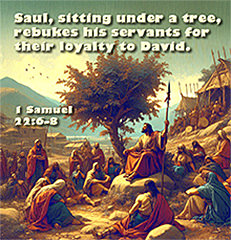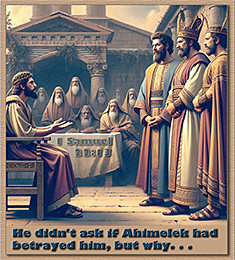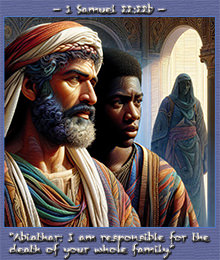1 Samuel 22:6–23:14 . . . Bible Study Summary, Videos, and Questions
“Saul Reaches His All-Time Low”
Today, as we venture further into chapter 22, we see Saul, a king who's completely lost his grip, mentally speaking. His fits of depression and jealousy appear to become more intense and more frequent as we read succeeding chapters. He appears now to be in a constant state of fear and jealousy. In today's passage, we'll see him reach an all-time low! His fear of David will drive him to begin killing innocent people, an almost unthinkable thing.
[Note: Click the link to This Week’s Passage near the bottom of this page to read today’s Scripture.]
Saul Questions the Loyalty of Fellow Benjamites (22:6–10)
At the close of our previous discussion of 1 Sam. 21:1–22:5), we saw that Gad, a prophet, urged David to flee from the cave's stronghold in Gath and go to Judah's forest of Adullam, because Saul was becoming increasingly paranoid. David and his troupe followed Gad's recommendation (22:5). But we'll soon see that King Saul is about to kill not just one priest, but to make an attempt to execute all the priests and their families, despite the instructions that God had told Israel and her king, regarding their respect for, and obedience to, the priests (see Deuteronomy 17:8–13).
Though Saul knew where David was, he couldn't capture him. Overcome by paranoia, Saul accused his tribesmen, the Benjamites, of conspiracy, of keeping him in the dark about Jonathan's covenant with David. This accusation prompted Doeg the Edomite to tell Saul, albeit belatedly, that he'd seen David being helped in a number of ways by High Priest Ahimelek (21:1–9). Doeg declared aloud, "I saw the son of Jesse come to Ahimelek son of Ahitub at Nob. Ahimelek inquired of the Lord for him; he also gave him provisions and the sword of Goliath the Philistine" (vv. 9b–10).
Saul sat beneath a noted tree at Gibeah, holding his spear; we've seen him in such a setting as this previously. Whenever he held his spear, he was likely about to try to kill someone. In v. 7, Saul asks his Benjamite officials, "Will the son of Jesse give all of you fields and vineyards?" Saul appealed to the truly worst in these men, asking them if a man from Judah would favor the tribe of Benjamin with riches and promotions. Notice, too, how Saul refers to David: He referred to him as the son of Jesse. He didn't say, "the man who killed Goliath," or "the man who killed 200 Philistines," or "the man anointed by God." Saul knew that David came from a family of simple farmers, so he called him by the most down-to-earth name he could think of: son of Jesse.
He went on in v. 8 to ask his fellow Benjamites, "Is that why you have all conspired against me?" In his fleshly, self-focused world, everything revolved around Saul. He became paranoid, he whined, and he led his people through guilt and accusation. Verse 8 ends with Saul's follow-up ranting: ". . . my son [Jonathan] has incited my servant to lie in wait for me, as he does today." Jonathan never did that, but Saul couldn't accept the truth that David and Jonathan were in the right while he was in the wrong. So he constructed elaborate conspiracies against David.
He apparently thought that the entire world was against him and for David. The term conspired appears twice in our text (in vv. 8 and 13). He accused virtually everyone of being part of a sinister plot against him, when in reality it was God who'd taken away his kingdom because he'd sinned (see 13:8–14; 15:1–31). Following the guilt-trip rantings that Saul had brazenly sworn against his servants, Doeg the Edomite stepped up. We last saw Doeg in 21:7 while he was at the tabernacle in Nob, at the same time David went there. Doeg went on to inform Saul of David’s visit to Ahimelek, turning Ahimelek’s innocent compliance with David’s requests into insinuations that implicated the guiltless priest as being David's hearty accomplice.
Also in v. 8 are amazing accusations that Saul makes against his son, Jonathan. Saul's conspiracy theory went even further. Not only did he accuse Jonathan and David of conspiring against him, he also accused all of his servants of conspiracy! Surrounded by them as he sat under the tamarisk tree (v. 6), he began by reminding them about the spoils of political victory and power. As a reward for their loyalty to Saul, these Benjamites had been given property and positions of authority. Saul reminded his servants that they owed him big time. As a result, he earned a payback from them that amounted to them informing him of David’s whereabouts. He told his servants that by keeping silent about David, and withholding information about him and his whereabouts, they were joining David in his conspiracy against Saul.
Saul Annihilates the Priests of Nob and Their Families (vv. 11–19)
Following Saul's browbeating of his servants, Doeg disclosed to Saul that David had met with Ahimelek the high priest, who inquired of the Lord for him, and gave him sacred bread and the sword of Goliath. Hearing that, Saul felt that nothing more was needed to convict the priest of conspiracy. Sadly, in Saul's mind, not only Ahimelek but all of the priesthood participated in the “conspiracy” against him. He revealed his disdain for both David and Ahimelek by the way he addressed each, calling them by their father’s names: “the son of Jesse” (v. 8) and “the son of Ahitub” (v. 12). For his part, he continued in his reckless paranoia. Not only did he accuse Ahimelek and David of conspiracy against him, he also thought that David was out to kill him. Saul thought of himself as the victim. In his mind, David and Ahimelek were out to get him!
Failing to seek the truth, Saul hastened to condemn the priests as traitors to the throne. He didn't ask if Ahimelek had betrayed him, but why (v. 13). Speaking in his own defense, Ahimelek responded with remarkable poise. He didn't cast blame on David for having deceived him, which he'd done; instead, he stood up to Saul, speaking on David’s behalf, reminding the king that David wasn't only his most faithful servant but the man whom the people honored, and whom Saul had promoted to positions of power and authority. He felt that Saul should at least remember that David was his son-in-law (v. 14).
Ahimelek was so unaware of the hatred that Saul had for David that he praised David in front of the jealous king. As a result, Saul utterly annihilated all "eighty-five priests" in town; and "men and women, its children and infants, and its cattle, donkeys and sheep" in Nob — the entire town! [Note: The text says that Doeg killed 85 priests, but Josephus wrote that he killed "Ahimelech and all his family, who were in all three hundred and eighty-five." The Septuagint also has 385.] Saul was so out of control that he'd kill Yahweh's own consecrated servants! This mass murder event severely damaged Saul's ability to lead. He'd lost any moral high ground among his people, along with his ability to seek God's will through the Urim and Thummim, which the priests had possessed and used giftedly. Saul was resigned to make future decisions blindly. Since he could no longer inquire of the Lord, he'll ultimately turn to sorcery at the hands of Endor the witch, which we'll cover in chapter 28.
“You will surely die, Ahimelek, you and your whole family,” said King Saul to the high priest (v. 16). Any man who finds himself in the place of sin and rebellion as Saul had found himself couldn't stand to see an innocent man, such as Ahimelek, be in disagreement with him. So, he commanded that he be murdered, which documents his falling faster and faster away from the Lord. He'd attempted to kill David many times before, and even tried to kill his own son. Now he ordered the death of innocent bystanders, the priests of the Lord, their families, the people of their town, and the full extent of their livestock.
Saul was reluctant to kill the enemies of the Lord when he was commanded to do so (15:9). But here he had no misgivings to murder the Lord's priests in cold blood. He was clearly going off the deep end, committing the worst act he'd ever do. To the credit of Saul's servants, they feared God more than Saul, refusing to murder the priests. But Saul wouldn't be thwarted. He turned to Doeg the Edomite, who wasn't a Jew, who didn't hesitate to murder the priests and all of their family members. Saul, the man who wasn't so zealous to kill the Amalekites, even though ordered to do so by God, was now zealous in ordering the killing of the priests, their family members, and their cattle, even though forbidden to do so by God.
Priest Abiathar Flees to David (vv. 20–23)
We see in v. 20 that one priest, Abiathar, escaped the slaughter. He successfully fled to join David, telling him what Saul had done to the other eighty-four priests and their families. When David learned about Saul's decimation of the Lord's priests, he was heartsick and felt at fault, assuming full responsibility, admitting that he'd seen Doeg when he was at Nob, and that he knew that Doeg would likely report David’s visit to Saul (v. 22). David couldn't do anything for those who'd been slain, but he was able to safely offer sanctuary to Abiathar. He invited the high priest's son to stay with him for his own safety.
But there was another important benefit of Abiathar's presence: it was his ephod. An ephod was part of a high priest's garments; it included the Urim and Thummim, which apparently were lots used to determine God's will when David inquired of Yahweh. With that ephod, David gained the ability to learn God's will about key decisions. In addition, both David and the prophet Gad possessed a prophetic gift to hear from God (see 2 Samuel 23:1–2). David was indeed led by the Lord, while Saul lived and acted in the dark. David will see (as we should see) that, out of tragedy, God brings light.
David Inquires of the Lord (23:1–14)
The literary spotlight moves from Saul to David and his activities. As Saul's disregard for God's law increased, David's submission to God increased. While David hid in the stronghold (22:5) he was safe, but he couldn't be reached when needed to help God's people. One of the great reasons why God called David out of the stronghold, into a place of greater danger (Judah), was to enable him to serve and bless God's people more effectively. Immediately, David realized that he needed to inquire of the Lord. Philistine raiders were attacking the walled Judaean city of Keilah, just south of Adullam Cave. The raiders were "looting the threshing floors," stealing Israel's crops at harvest time.
Why did they bring this plea for help to David instead of King Saul? Because Saul wasn't fulfilling his role as king over Israel. Yes, it was Saul's job to protect Keilah by fighting against the Philistines, but Saul wasn't doing his job, so the Lord called David to do it. God loved his people too much to let them suffer under an unfaithful king. If Saul wasn't up to the task, God would raise up a man who was; David was that man. God directed David to act like a king, even if he wasn't Israel's king yet.
As a result, "David inquired of the Lord, and the Lord answered him" (v. 4). This shows David's wisdom and godliness. Some might have immediately said, This isn't my responsibility, it's Saul's. Let him deal with it. Others might have declared, Let's go! I can fix this problem! Get out of my way so I can do it! Both responses would have been foolish. But David was wise because he inquired of the LORD.
David’s men were uneasy about the decision to fight the Philistines, and they let David know it (v. 3). Their apprehension isn't hard to appreciate. After all, their small force of 600 men (v. 13) wasn't a highly trained mass of soldiers, but a rag-tag group of discontented men who'd fled from Saul (22:2), most of whom joined forces with David while he was hiding in the Cave of Adullam. Since Keilah was located approximately 20 miles southeast of Gath, David and his men would no longer be safe in the mountain forest and would instead be in the lowlands, out in the open, where they could be spotted by Saul’s army and opposed by Philistine chariots.
Although he listened to his men's objections, David was intent on obeying God rather than men. He “inquired of the Lord” a second time (v. 4) and received the same response, with the assurance that God had already given them the victory. With this assurance, he and his men approached the city of Keilah, attacked the Philistines, and won a decisive victory, delivering the Israelites there from defeat and acquiring the Philistines’ livestock (v. 5). He learned of Saul’s coming attack and wondered whether it was wise to stay in Keilah. Seemingly wanting to avoid his own capture, he was also concerned about the wellbeing of those in Keilah. Fortunately, when Abiathar fled to join David, he brought with him the ephod, by which the will of the Lord could be discerned (v. 6).
The writer recorded in this passage that David inquired of the Lord four times (vv. 2, 4, 10, 11). So, informed by God as to the outcome of remaining in Keilah, David and his 600 followers left that city and returned to the wilderness, hiding safely in the strongholds there. Learning of David’s departure, Saul had his men turn back, thereby sparing the city of Keilah, not only from the Philistines but from Saul.
† Summary of 1 Samuel 22:6–23:14
In today’s passage, Saul’s obsession with capturing David intensifies, resulting in tragic consequences and further highlighting God’s protection over David. When Saul hears that David and his men have been discovered, he rebukes his servants for loyalty to David, accusing them of conspiracy (22:6–8). Doeg the Edomite reports David’s visit to Nob and the kindness shown by Ahimelech the priest. Saul summons Ahimelech and the other priests, accuses them of helping David, and, after they plead innocence, orders their execution. Doeg executes eighty-five priests and slaughters the inhabitants of Nob, except Abiathar, who escapes and joins David, telling him all that happened (vv. 9–23). David acknowledges responsibility and assures Abiathar of protection, foreshadowing the ongoing conflict with Saul.
Meanwhile, David hears that the Philistines are attacking Keilah. He seeks God’s guidance through Abiathar the priest, asking if he should deliver the town, and God directs him to go, promising victory (23:1–4). David and his men rescue Keilah, but when Saul hears David is there, he plans to besiege the city. Again, David inquires of God and learns that the people of Keilah would surrender him to Saul. He and his men — now about 600 strong — escape to the wilderness (vv. 5–13). David flees to the strongholds of the wilderness of Ziph, where God continues to protect him, and Jonathan visits to encourage him, reaffirming their covenant and God’s promise that David will one day be king (vv. 14–15).
Key points with verse references:
• Doeg the Edomite informs Saul of David’s visit to Nob, leading Saul to order the massacre of eighty-five priests and the destruction of Nob, sparing only Abiathar (22:6–23).
• Abiathar escapes to David, bringing news of the tragedy and becoming an ally and priest for David’s company (vv. 20–23).
• David seeks God’s guidance and twice inquires of the Lord through Abiathar whether to save Keilah and whether to remain there; God directs him at each step (23:1–4, 10–12).
• After rescuing Keilah from the Philistines, David escapes when told the men of Keilah would surrender him to Saul (vv. 5–13).
• David abides in the wilderness strongholds, under constant threat from Saul, but God protects him; Jonathan visits, strengthens David’s faith, and reaffirms God’s promise that David will be king (vv. 14–15).
This passage underscores Saul’s increasing violence, David’s reliance on God’s guidance, and the enduring faithfulness of God and David’s closest friends.
This Week's Passage
1 Samuel 22:6–23:14
New International Version (NIV) [View it in a different version by clicking here; also listen to chapter 22 narrated by Max McLean].
† Summary Video: “The First Book of Samuel”
† Watch this introductory video clip created by BibleProject on bibleproject.com.
- Q. 1 What did Saul wrongly conclude about Ahimelek and the other priests at Nob?
- Q. 2 How did David react when he learned of the annihilation? Did he fear for his life?




